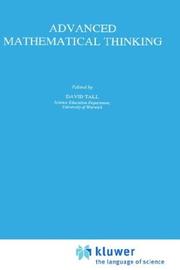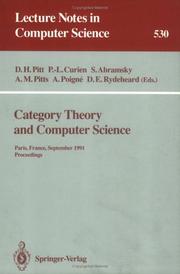| Listing 1 - 2 of 2 |
Sort by
|

ISBN: 0792314565 0792328124 9786610207541 128020754X 0306472031 9780792328124 9780792314561 Year: 1991 Volume: 11 Publisher: Dordrecht: Kluwer,
Abstract | Keywords | Export | Availability | Bookmark
 Loading...
Loading...Choose an application
- Reference Manager
- EndNote
- RefWorks (Direct export to RefWorks)
Advanced Mathematical Thinking has played a central role in the development of human civilization for over two millennia. Yet in all that time the serious study of the nature of advanced mathematical thinking – what it is, how it functions in the minds of expert mathematicians, how it can be encouraged and improved in the developing minds of students – has been limited to the reflections of a few significant individuals scattered throughout the history of mathematics. In the twentieth century the theory of mathematical education during the compulsory years of schooling to age 16 has developed its own body of empirical research, theory and practice. But the extensions of such theories to more advanced levels have only occurred in the last few years. In 1976 The International Group for the Psychology of Mathematics (known as PME) was formed and has met annually at different venues round the world to share research ideas. In 1985 a Working Group of PME was formed to focus on Advanced Mathematical Thinking with a major aim of producing this volume. The text begins with an introductory chapter on the psychology of advanced mathema- cal thinking, with the remaining chapters grouped under three headings: • the nature of advanced mathematical thinking, • cognitive theory, and • reviews of the progress of cognitive research into different areas of advanced mathematics.
Mathematics --- Study and teaching --- Psychological aspects --- 510.2 --- -#WWIS:AGGR --- Math --- 510.2 Foundations of mathematics --- Foundations of mathematics --- Education. --- Mathematics. --- Mathematics Education. --- Mathematics, general. --- Study and teaching. --- #WWIS:AGGR --- Science --- Cognitive psychology --- Didactics of mathematics --- Psychological aspects. --- Mathematics—Study and teaching . --- Mathematics - Study and teaching --- Mathematics - Psychological aspects --- Mathematics. Psychological aspects --- Mathematics. Study and teaching


ISBN: 354054495X 3540384138 038754495X Year: 1991 Publisher: Berlin ; New York, NY : Springer-Verlag,
Abstract | Keywords | Export | Availability | Bookmark
 Loading...
Loading...Choose an application
- Reference Manager
- EndNote
- RefWorks (Direct export to RefWorks)
The papers in this volume were presented at the fourth biennial Summer Conference on Category Theory and Computer Science, held in Paris, September3-6, 1991. Category theory continues to be an important tool in foundationalstudies in computer science. It has been widely applied by logicians to get concise interpretations of many logical concepts. Links between logic and computer science have been developed now for over twenty years, notably via the Curry-Howard isomorphism which identifies programs with proofs and types with propositions. The triangle category theory - logic - programming presents a rich world of interconnections. Topics covered in this volume include the following. Type theory: stratification of types and propositions can be discussed in a categorical setting. Domain theory: synthetic domain theory develops domain theory internally in the constructive universe of the effective topos. Linear logic: the reconstruction of logic based on propositions as resources leads to alternatives to traditional syntaxes. The proceedings of the previous three category theory conferences appear as Lecture Notes in Computer Science Volumes 240, 283 and 389.
Categories (Mathematics) --- Computer science --- Congresses. --- -Computer science --- -681.3*D21 --- 681.3*D31 --- 681.3*D33 --- 681.3*F3 --- 681.3*F41 --- Informatics --- Science --- Congresses --- Requirements/specifications: languages; methodologies; tools (Software engineering)--See also {681.3*D31} --- Formal definitions and theory: semantics; syntax (Programming languages)--See also {681.3*D21}; {681.3*F31}; {681.3*F32}; {681.3*F42}; {681.3*F43} --- Languages constructs: abstract data types; concurrent programming structures;control structures; coroutines (Programming languages) --- Logics and meanings of programs (Theory of computation) --- Mathematical logic: computability theory; computational logic; lambda calculus; logic programming; mechanical theorem proving; model theory; proof theory;recursive function theory--See also {681.3*F11}; {681.3*I22}; {681.3*I23} --- 681.3*F41 Mathematical logic: computability theory; computational logic; lambda calculus; logic programming; mechanical theorem proving; model theory; proof theory;recursive function theory--See also {681.3*F11}; {681.3*I22}; {681.3*I23} --- 681.3*F3 Logics and meanings of programs (Theory of computation) --- 681.3*D33 Languages constructs: abstract data types; concurrent programming structures;control structures; coroutines (Programming languages) --- 681.3*D31 Formal definitions and theory: semantics; syntax (Programming languages)--See also {681.3*D21}; {681.3*F31}; {681.3*F32}; {681.3*F42}; {681.3*F43} --- 681.3*D21 Requirements/specifications: languages; methodologies; tools (Software engineering)--See also {681.3*D31} --- 681.3*D21 --- Mathematics. --- Information theory. --- Logic design. --- Computer science. --- Software engineering. --- Mathematics, general. --- Theory of Computation. --- Logics and Meanings of Programs. --- Mathematical Logic and Formal Languages. --- Programming Languages, Compilers, Interpreters. --- Software Engineering. --- Computer software engineering --- Engineering --- Design, Logic --- Design of logic systems --- Digital electronics --- Electronic circuit design --- Logic circuits --- Machine theory --- Switching theory --- Communication theory --- Communication --- Cybernetics --- Math
| Listing 1 - 2 of 2 |
Sort by
|

 Search
Search Feedback
Feedback About UniCat
About UniCat  Help
Help News
News